Which Parrot is Right for You?
Owning a parrot is an extremely rewarding experience. Parrots of all types are intelligent, fun, entertaining and engaging, and because of these qualities make fantastic companions.
But with more than 400 different species to choose from, deciding which one is right for you can be a challenge, and getting it wrong isn’t fair on you or your pet.
To help make that decision a little bit easier, we’ve put together this handy guide to help ensure you and your parrot enjoy a long and happy friendship together.
Consider your Lifestyle
Very often, the first thing that attracts people to parrots is how they look. After all, who wouldn’t be enticed by their colourful plumage, proud-standing head feathers, and their funny antics?
However, this isn’t always the best basis for choosing a parrot. Amazons and Macaws may look spectacular, but they are also the species that need the most time, care and attention.
A far better way to decide on which parrot to buy is to match it to your lifestyle. Ask yourself questions such as is this your first parrot? Do you live by yourself or with others? Are you out at work all day or at home a lot of the time? Do you have other pets? Do you have a lot of time to interact with your parrot or not? How much space do you have?
All these things and more will need to be considered when deciding which parrot to purchase.
Lifespan is another thing you must think carefully about. Macaws can live for up to 50 years and African Greys to more than 60. If you go for one of these, you’re likely to have the bird for the majority of your life and it could even outlive you, meaning you’ll need to make provision for it should you drop off the perch first, so to speak.
So, there’s lots to consider when deciding on which species of parrot to buy. With that in mind, let’s take a closer look at the different types of parrot that are available and what they’re like to own.
Different Types of Parrot
Parrots are categorised by size; small, medium, large and extra-large. As a rule of thumb, larger species live longer and require more management than smaller species, although that isn’t always the case.
Small Parrots
The small category includes Budgies, Cockatiels, Lovebirds, small Parakeets and Parrotlets.
Cockatiels and Budgies are the most popular pet parrots and there is good reason for that. This group has been domesticated much longer than the others, therefore are the easiest to handle.
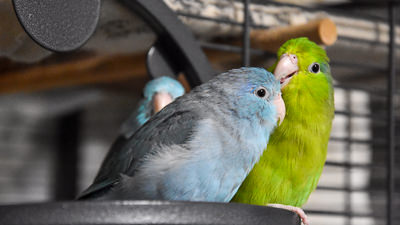
They will also live quite happily in smaller enclosures than their larger counterparts, meaning if space is a bit tight, one of the smaller parrots might be the best option.
Smaller parrots are also less expensive. A Budgie might set you back £25, whereas a large Macaw can cost upwards of £1,000. And whereas small parrots do select favourite people from within the family, they tend to not to be too aggressive to non-favourites so fit into family life well.
Lovebirds, small Parakeets and Parrotlets can also make good first-time pets, but they require more attention than Budgies and Cockatiels. They’re intelligent and bond well with their owners but they require a lot of exercise and socialisation, so if you’re thinking about buying one, you must ensure you have enough time to spend with it.
The only issue to consider with the small parrot group is that they are not the most talkative of birds. So, if talking is a quality you really want, this group might not be for you.
Medium Parrots
The medium parrot group includes Caiques, Conures, Lories and Lorikeets, large Parakeets, Pionus, Senegals and many more.
Medium-sized parrots are bigger (no surprises there) and tend to live longer than their small-group cousins. They also tend to be more energetic and require more space than Budgies and Cockatiels.
Caiques, in particular, are high-energy birds that have been described as the clowns of the avian world, although this seems unfair. They need a lot of space and don’t fare well if confined to a small enclosure. In fact, the best way to keep them is in an aviary.
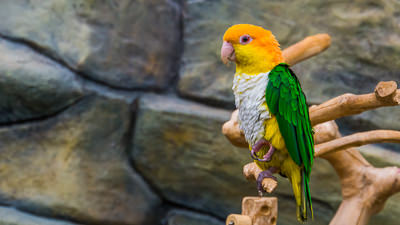
The Conures are one of the most varied groups of parrots and span both the large and medium types. One thing that links them all, however, is that they are bold, often noisy birds that need a lot of enrichment to keep them occupied.
They can make great family pets because they love to be around people, and they can be trained to do tricks with patience and positive reinforcement.
However, Conures and other medium-sized parrots can be a bit of a handful for a first-time owner unless you are very dedicated, have plenty of time and perhaps have a mentor with experience of these lively, pretty birds.
Large and Extra-Large Parrots
The large and extra-large groups include favourites such as African Greys, amazons, large cockatoo, and Macaws.
These impressive birds, with their colourful, exotic plumage, are what most people have in mind when they decide they want a parrot. And it is easy to see why. They truly are magnificent creatures that in the right hands, make truly magnificent pets.
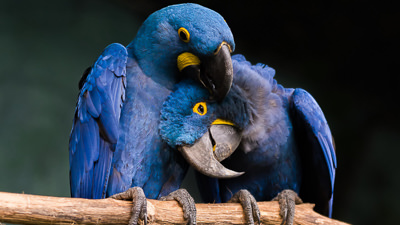
But the important phrase here is ‘in the right hands’. Larger parrots come with a warning! They can be aggressive, noisy and even destructive when bored, making them a handful for even experienced owners. And remember, they can live for decades, so if your parrot develops bad traits, you could have to put up with them for many, many years!
Buying a Parrot
So, you’ve made a thorough and honest assessment of your lifestyle, the free time you have available, your avian experience, you’ve set your budget, and you’ve decided on the type of parrot which will suit you best. It is time to buy one.
But where do you get one from?
Of course, there are pet shops which often have a selection of smaller parrots. Some independent shops specialise in birds and often, the shop owner will be very knowledgeable so as a first-time buyer, this can be valuable.
Larger chains often have parrots too and will usually have a member of staff who can guide you on owning and caring for your new friend.
For bigger parrots, you may have to find a specialist breeder, and here, Google can help. Search for breeders of the variety you are interested in, in your area. Alternatively, get involved with your local club or go to a dedicated parrot show, where you will meet people who will be able to point you in the right direction.
Shows are also great places to pick up any equipment you might need and to meet like-minded people who may give you valuable advice.
You can also contact The Parrot Society for information on all aspects of parrot behaviour and advice on how to look after them properly.
Finally, if you’re not concerned about getting a young bird, consider adopting one from a rescue centre or charity. Due to the longevity of these birds, as well as other issues such as divorce or family break down, sadly, a number do find their way to animal shelters.
By adopting such a bird, you would be doing it a great service and the chances are it will still make a wonderful pet. So, if you want to do a good deed, why not give a rescue bird a good home?
Relinquishing a Parrot
It goes without saying that you should never buy any kind of pet without thinking long and hard about whether you can care for that pet for the duration of its lifetime. To not do so is irresponsible.
However, even with the best planning in the world, life changes can come along when we least expect it, leaving us unable to look after the pets we love.
So, if the unthinkable happens and you have to relinquish your parrot, how do you do it?
There are a number of organisations that will take a parrot that needs rehoming. See our list of great rescue and rehabilitation homes for parrots. If you’re still struggling to find a local rehoming centre, then contact us and we will try and help you find one. Or, get in touch with The Parrot Society and they will be able to give you lots of good advice and point you in the right direction.
Our Recent Posts Giving Advice and Guidance on Parrots & Parakeets
Ahoy the Mighty Macaws – the Pirate’s Favourite!
Reading Time: 15 minutes Mention the word parrot and the first thing many people think of is a Macaw. Sat abreast many a pirate’s shoulder in books, TV, films and cartoons, these colourful, long-tailed birds are big, beautiful, instantly recognisable as the archetypal parrot, and always happy to take a tasty treat from their owner.
Johnston & Jeff Appointed as Exclusive Distributor of Innovative New Pelleted Bird Food
Reading Time: 6 minutes We are very excited to have been appointed as the exclusive UK distributor for an innovative new pelleted bird feed. Italian manufacturer Fiory has created a cold pressed pellet range called Micropills, suitable for parrots and parakeets, and has signed an exclusive deal with us to sell it in the UK.
Ring-Necked Parakeets – the UK’s Only Wild Species of Parrot
Reading Time: 8 minutes Did you know that the UK has its own population of wild Parakeets? Yes, that’s right, a wild parrot in Britain and one that is growing in population. In this blog, we take a closer look at the fascinating Ring-Necked Parakeet.



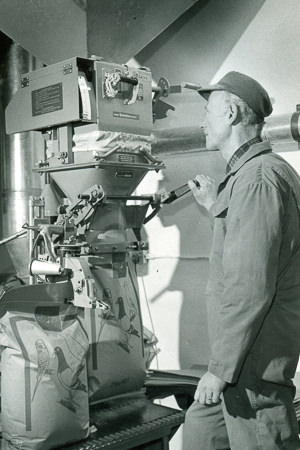


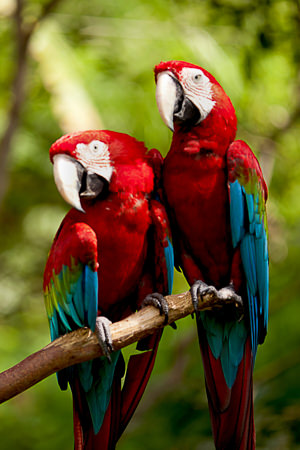
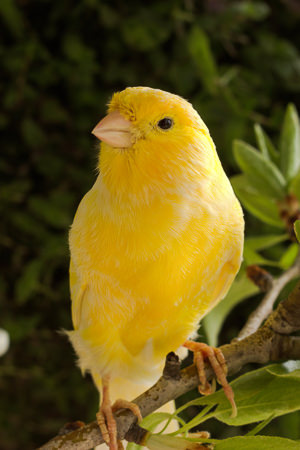


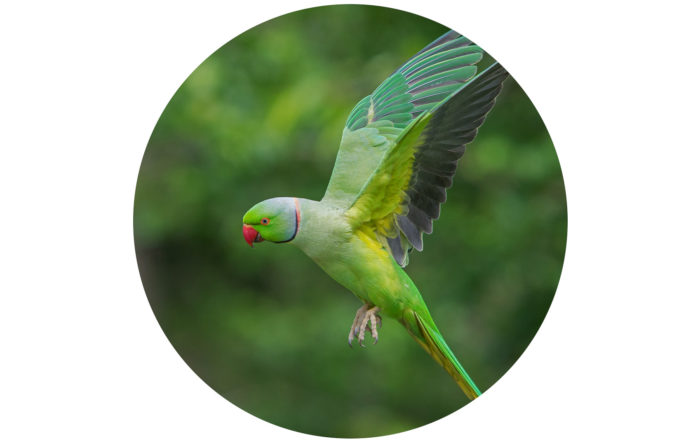
Leave A Comment